De Ierse dichter Patrick Kavanagh werd geboren op 21 oktober 1904 in County Monaghan. Zie ook mijn blog van 21 oktober 2010 en eveneens alle tags voor Patrick Kavanagh op dit blog.
Stony Grey Soil
O stony grey soil of Monaghan
The laugh from my love you thieved;
You took the gay child of my passion
And gave me your clod-conceived.
You clogged the feet of my boyhood
And I believed that my stumble
Had the poise and stride of Apollo
And his voice my thick tongued mumble.
You told me the plough was immortal!
O green-life conquering plough!
The mandril stained, your coulter blunted
In the smooth lea-field of my brow.
You sang on steaming dunghills
A song of cowards’ brood,
You perfumed my clothes with weasel itch,
You fed me on swinish food
You flung a ditch on my vision
Of beauty, love and truth.
O stony grey soil of Monaghan
You burgled my bank of youth!
Lost the long hours of pleasure
All the women that love young men.
O can I stilll stroke the monster’s back
Or write with unpoisoned pen.
His name in these lonely verses
Or mention the dark fields where
The first gay flight of my lyric
Got caught in a peasant’s prayer.
Mullahinsa, Drummeril, Black Shanco-
Wherever I turn I see
In the stony grey soil of Monaghan
Dead loves that were born for me.
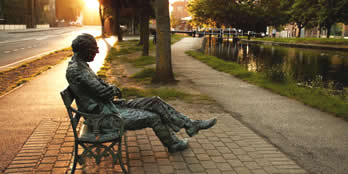
Patrick Kavanagh (21 oktober 1904 – 30 november 1967)
Standbeeld langs het Grand Canal, Dublin
De Pakistaanse auteur, journalist en filmmaker Tariq Ali werd geboren in Lahore op 21 oktober 1943. . Zie ook alle tags voor Tariq Ali op dit blog en ook mijn blog van 21 oktober 2009 en ook mijn blog van 21 oktober 2010.
Uit: Shadows of the Pomegranate Tree
“This was the ancient space where once Moorish knights used to ride and joust to catch the eye of their ladies; where the populace would assemble in large numbers, children riding on the shoulders of fathers, uncles and elder brothers as they cheered their favourites; where catcalls greeted the appearance of those who paraded in the armour of knights simply because they were creatures of the Sultan. When it was clear that a brave man had allowed one of the courtiers to win out of deference to the King or, just as likely, because he had been promised a purse full of gold dinars, the citizens of Gharnata jeered loudly. It was a citizenry well known for its independence of mind, rapier wit, and reluctance to recognize superiors. This was the city and this the place chosen by Cisneros for his demonstration of fireworks that night. The sumptuously bound and decorated volumes were a testament to the arts of the Peninsulan Arabs, surpassing the standards of the monasteries of Christendom. The compositions they contained had been the envy of scholars throughout Europe. What a splendid pile was laid before the population of the town. The soldiers who, since the early hours of the morning, had been building the wall of books had avoided the eyes of the Gharnatinos. Some onlookers were sorrowful, others tempestuous, eyes flashing, faces full of anger and defiance. Others still, their bodies swaying gently from side to side, wore vacant expressions. One of them, an old man, kept repeating the only sentence he could utter in the face of the calamity. `We are being drowned in a sea of helplessness.’ Some of the soldiers, perhaps because they never had been taught to read or write, understood the enormity of the crime they were helping to perpetrate. Their own role troubled them. Sons of peasants, they recalled the stories they used to hear from their grandparents, whose tales of Moorish cruelty contrasted with accounts of their culture and learning. There were not many of these soldiers, but enough to make a difference.”
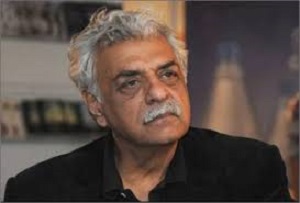
Tariq Ali (Lahore, 21 oktober 1943)
De Griekse dichter en schilder Nikos Engonopoulos werd geboren op 21 oktober 1907 in Athene. Zie ook alle tags voor Nikos Engonopoulos op dit blog en ook mijn blog van 21 oktober 2009 en ook mijn blog van 21 oktober 2010.
BOLIVÁR (Fragment)
A Greek Poem
Boyaca, Ayacucho. Ideas both illustrious and eternal. I was
there.
We’d already left the old frontiers far behind:
Back in the distance, fires were burning in Leskovik.
And in the night, the army moved up towards the battle, its
familiar sounds could already be heard.
Opposite, a grim Convoy of endless trucks returned with the
wounded.
Don’t anyone be alarmed. Down there, see, the lake.
This is the way they’ll come, beyond the rushes.
The roads have been mined: the work and repute of that
Hormovo man, renowned, unrivalled in such matters.
Everyone to their stations. The whistle’s sounding!
Come on, come on. Get the cannons uncoupled and set up,
clean the barrels with the swabs, fuses lit and held
ready,
Cannon-balls to the right. Vrass!
Vrass, Albanian for fire: Bolivár!
Every pineapple that was hurled and exploded,
Was a rose to the glory of the great general,
As he stood, stern and unshaken, amid the dust and tumult,
Gazing on high, his forehead in the clouds,
And the sight of him caused dread: fount of awe, path of
justice, gate of salvation.
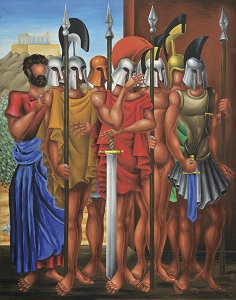
Nikos Engonopoulos (21 oktober 1907 – 31 oktober 1985)
Alexander, son of Philip, and the Greeks apart from the Spartans door Nikos Engonopoulos, 1963
De Frans-Algerijnse schrijver en regisseur Mehdi Charef werd geboren op 21 oktober 1952 in Maghnia in Algerije. Zie ook alle tags voor Mehdi Charef op dit blog en ook mijn blog van 21 oktober 2010.
Uit: A bras le coeur
« Les deux donzelles sont au bord de l’asphyxie, elles chancellent, s’agrippent à leur voile. Elles se mettent à tousser et vlan ! La première tombe à la renverse et vomit abondamment. Farida ne tarde pas à l’imiter. Elle rejette tout ce qu’elle a dans l’estomac… Elles rendent leur poignante histoire d’amour, les larmes coulent sur leurs joues écarlates. Mbami lève les bras, triomphant, et remercie les esprits. Puis il dit aux mères :
– Le démon sort même par le nez ; je fais en sorte de l’évacuer de tous les orifices par lesquels il s’est ingénieusement immiscé pour propager son pouvoir maléfique, et pour régner à la place de la Loi. Écoutez-le gémir, pleurer, contraint de quitter vos filles par la force de l’esprit. Il ne revient jamais sur les lieux de ses défaites. Vos filles sont libérées.
Les mères prient, remercient, glissent des sous sur la natte. Soutenues par leurs mères, les deux amies se redressent, vaincues, un mouchoir sur la bouche, le foulard trempé de larmes. Farida refuse de boire le liquide sirupeux et verdâtre, mélangé à des herbes, que le marabout a versé dans une petite tasse. L’autre boit et crache aussitôt la mixture gluante, dans son mouchoir, avec une grimace diabolique. Le sorcier se lève. Il faut laisser la place. Soulagées, les mères m’enjambent pour sortir. Les deux amoureuses, humiliées et le front bas, suivent l’une derrière l’autre. Elles me frôlent. Au moment où elles passent devant moi, je surprends une belle image : la main de Farida effleure celle de son amie qui s’ouvre alors pour recevoir un billet froissé, un mince message roulé en boule. Je ris. Puis, je me lève et je me présente devant le marabout. »
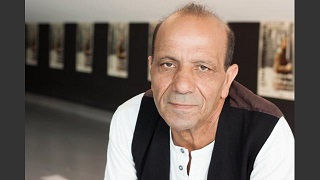
Mehdi Charef (Maghnia, 21 oktober 1952)
De Amerikaanse dichter, schrijver en criticus Allen Hoey werd geboren op 21 oktober 1952 in Kingston, New York. Zie ook alle tags voor Allen Hoey op dit blog en ook mijn blog van 21 oktober 2010.
Uit: Provençal Light, a long poem
After the Orchard: “Souvenir de Mauve” (fragment)
We must
seize the instant. Learn our craft, yes. Hours with pencil or reed
whittled down to a point fine or thick as the study demands; they give
the fluid stroke of a brush where needed and the line sharp when held firm.
And perspective–here the light creates depth the eye captures best
from the planes of juxtaposed color, a Japanese print brought to life.
But learn, as Mauve taught me, the palette’s arrangement, change it
as the light demands–I owe the man that.
How sad, how it robs
some of the luster from a glorious day, to find my sister’s notice.
Mauve is dead. And not that old–still years of canvas to go.
What I bring to this peach tree, bright where his palette was dim,
I owe him. He had faith, he counseled my father when all
thought this drawing another delusion. I never let on that I knew–
they were set when I traded the Bible for Ingres and pencil
to have me committed. For my own good. Of course. To prevent
more scandal. How I pained them, my trackless life, my mad
veering from calling to calling–why should he believe this path
was different, this calling that called me from his
would lead anywhere better? Poor man. How little he understood,
even persuaded my sketches showed promise. Ill-fitting
trousers and jackets he bought me when desperate for paper.
A father’s love grows less and less each year
like feasting on strawberries in spring until finally
he’s dead.
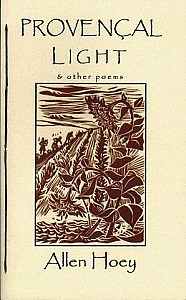
Allen Hoey (21 oktober 1952 – 16 juni 2010)
Cover
De Zwitserse schrijver en criticus Martin Roda Becher werd geboren in New York op 21 oktober 1944. Zie ook alle tags voor Martin Roda Becher op dit blog en ook mijn blog van 21 oktober 2010.
Uit: Tod im Stadion
„Vor ein paar Tagen bin ich dem Tod begegnet.
Es war auf einer verlassenen Aschenbahn im Spätherbst. In dieser Zeit wird sie nur noch selten benutzt. Gelbe Blätter bedeckten den Boden, die Kälte verlockte nicht zur Leichtathletik. Vielleicht zieht ein Unentwegter einmal seine Bahn, doch auch dieser ist froh, wenn er seine Runde hinter sich hat und den Ort verlassen kann, voll Genugtuung darüber, dasser zu den Untentwegten zählt. Es ist etwas Düsteres, Unheimliches an diesen verlassenen Sportstätten. Schwimmbäder, Aschenbahnen sind so tot im Winter wie eine Eisbahn im Sommer.
Sie erinnern mich seltsamerweise an Friedhöfe- und die Gewissheit, dass im nächsten Sommer wieder Hochbetrieb sein wird, spendet wenig Trost.
Ich weiss heute noch nicht, warum ich mich eingelassen hatte, laufen zu gehen. Ein nicht sehr guter Bekannter, ein Student der Rechte namens Ellenberger, hatte mich eines Tages aufgefordert, mit ihm etwas Freiluftsport zu treiben. Allein sei es öde, zu zweit mache es Spass. Und da mir, dem seit letztem Sommer schon eingerosteten Tennisspieler, etwas Bewegung nicht schaden konnte, sagte ich zu.
Am Morgen trafen wir uns dann. Gemeinsam machten wir uns zum Stadion auf.
Er war ein etwas zum Fettansatz neigender Mensch mit schwarzem Kraushaar auf dem Kopf. Ein manischer Witzbold, der für jede Lebenslage einen Scherz wusste und auch stets die “Neuesten” kannte. Sehr beliebt – er fehlte auf keinem Fest, da unterhaltsam (allein schon durch sein Aussehen) und bemerkenswert trinkfest. Als glatter Kerl wurde er bezeichnet, was im Alemannischen soviel wie lustig, nett, heissen will.
Dass er und ich, der im Gegensatz zu ihm ziemlich unbleibt und unglatt ist, nicht prächtig miteinander auskamen, war klar. Wahrscheinlich hatte er keinen anderen Kumpan für spätherbstliche Leichtathletik gefunden. Und so verfiel er dann eben auf mich.“
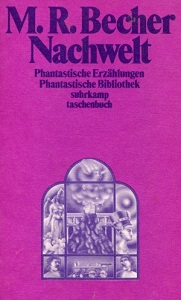
Martin Roda Becher (New York, 21 oktober 1944)
Cover
